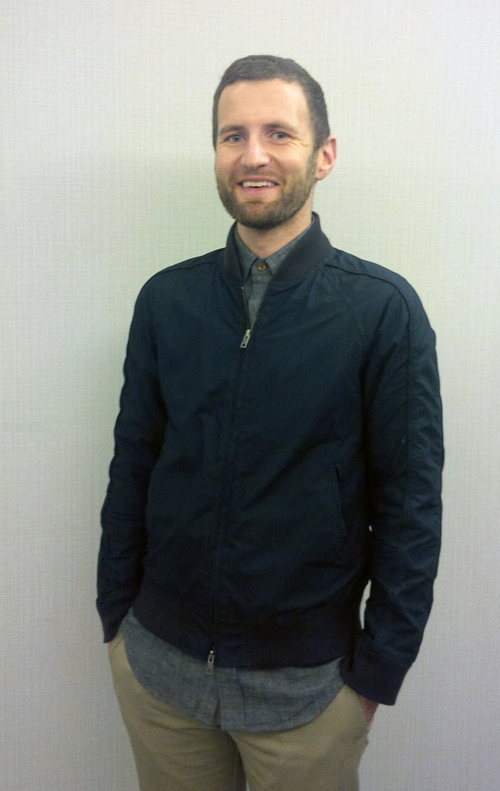In the Spotlight: Tom McMillan

When I read Tom McMillan’s winning Little Bird story, "It Starts Wonderful" (chosen by Zsuzsi Gartner in Little Bird Stories, Vol. 2 — if you don’t have it yet, get it!), I was impressed by the way he compressed the lives of six human beings — love, fear, illness, ambition, hope, I mean really, the whole stuff of life! — into a tiny story, under 500 words. The story whips through you. I had tears in my eyes at the end, while my head was going — what? how?
I invited Tom to be in the spotlight because I wanted to know more about this talented writer, to ask him about his process and practice, and read what he’s working on now.
His excerpt contains subject matter that is unexpected and troubling — read it below, and notice how embodied the narrative is, right away. By the time you realize why Dotty is so preoccupied with her teenaged son, you’re already physically involved in the scene. It’s a wonderful mix of interior voice with embodied action. Enjoy.
Meet Tom
 Tom McMillan is an Ottawa-based writer whose fiction has been published in the Toronto Star, Pithead Chapel, Spork Press, HOUSEFIRE and other kind places.
Tom McMillan is an Ottawa-based writer whose fiction has been published in the Toronto Star, Pithead Chapel, Spork Press, HOUSEFIRE and other kind places.
Handwriting or computer?
Almost every writer seems to recommend handwriting, and it makes sense, but I can't bring myself to do it. I love my computer. I only write with my computer.
Page count or time count?
Time, though I also try to follow Hemmingway's advice to always stop when I know what will happen next. My mind often changes overnight but it does make it easier to start again the next day.
First drafts or revision?
Revisions. Endless and endless revisions.
Writing solo, writing partner, or writing group?
Solo, except for one or two trusted, blunt (and painfully brilliant) readers.
Earplugs/quiet or headphones/music?
I don't really care either way, probably because of my journalism background. I pretty much only write in public places, which produces everything from dead silence to the nails-on-chalkboard screams of newborn babies.
How do you make time for your writing practice?
I found early on that the easiest way to make time for writing was to keep the process fun. What exactly that means depends entirely on personal taste. For me, I always get a small reward when I write — latte, chocolate chip cookie, whatever. It’s amazing how fast a dedicated routine can form.
What's the best advice you would give a new writer?
Learn to love the process. There are no guarantees that we’ll ever get published again or that the publishing industry will even still be here in twenty years (okay, it probably will, but you get it). Writing almost certainly will never pay my mortgage. As writers, the only thing we can control is how we choose to perceive our writing time. If you don’t enjoy and find meaning in the day-to-day grind of writing, then what’s the point?
Tell us about the excerpt you're sharing today
This story tries to capture the complex relationship between a mother and teenage son, and the impact their bad behaviors can have on each other. It’s actually still a work in progress as all the endings I’ve written are complete junk. This excerpt takes place near the story’s beginning, and hopefully gives you a sense of the piece.
Excerpt from A Hard Grind, by Tom McMillan
Her knees hinge. Her quads burn.
Grunting, Dotty counts down as the rocks slip beneath her bike tires. Fifty meters left, forty-five, forty. Only at the top of the slope does she pull to the side and glance back down the mountain. Shit. 3K into the ride and Phillip is already a half-click back.
His bike is barely moving.
Damn near going backwards.
On cue, her scrawny son dismounts. Dotty watches him push the bike up the trail, sweat staining his green tee, neck too thin for the collar. Phillip didn’t wear the $65 microfiber top she’d bought, meaning he’s pissed off. What else is new? They bicker endlessly over the same stupid subjects these days: her son’s self-diagnosed ADHD, his rapidly shrinking circle of friends, their wildly different feelings about exercise. But secretly, underneath everything, there is his weight, and the fact that one physician, two therapists and six months of high-calorie meals still haven’t determined if Dotty’s sixteen-year-old son is a) naturally skinny, b) anorexic or c) something else, something dark and new, something for which she feels completely ill-equipped.
“Race you to the river,” Dotty shouts. Her voice echoes a little.
Phillip waves a middle finger in reply.
Ahead, wrinkled roots crisscross the path. The descent steepens. Tubeless rubber tires bouncing, carbon frame shaking, Dotty picks up speed. She grips the handlebars until her forearms ache. Grind it out, grind it out, grind it out. Her own father’s philosophy.
She distracts herself from the pain with promises.
Start eating kale.
Ride four nights a week.
Be easier on Phillip.
Yes, Dotty hears the tone that appears whenever she criticizes the boy. What she tries to convey, what she means, is that this world is cold and I adore you and can protect you if you’ll let me. What comes out is more like Jesus who drank all the Diet Coke and why can’t you finish your plate like a normal person?
Her front tire catches a fallen branch, twisting the handlebars, careening the bike into a pine tree. She straightens in time, but it’s a rookie mistake.
Smarten up, Dotty. Get it together.
Four years ago the boy was built like a sun god, a toned teenage prince. Now he’s a matchstick. The lack of explanation for this change, the mysterious limits to medicine that have suddenly appeared and the confusion this ignorance sparks, has started seeping into everything. Dotty wakes at 3 a.m. worrying that the gas lines are leaking, that groundwater is seeping though the foundation. She gets promoted at work, loses twelve pounds, Botoxes her crow’s feet away— unable to shake the feeling that everything in life is turning to shit.
These days, Dotty only really feels right with sweat dampening her back. Peace is feet on the pedals and tires on the move. Everything hurting. Everything beginning to burn.
Note: These monthly spotlights showcase Mysterious Middle Drafts (MMDs). That means they are somewhere between first drafts and final drafts. This is a challenging stage! Emerging writers bravely share their work-in-progress here for discussion, but this is not a book review or critique: this is a venue for the appreciation of Mysterious Middle Drafts. Thank you for making this writing space safe and supportive.
Discussion:
-
What remains with you after reading Tom's work?
-
Can you articulate what’s working in this excerpt — and more importantly, why it’s working?
-
How is your own writing practice like Tom's? How is it different?
Please leave a comment below. And thank you, Tom!

1 comment
Leave a comment